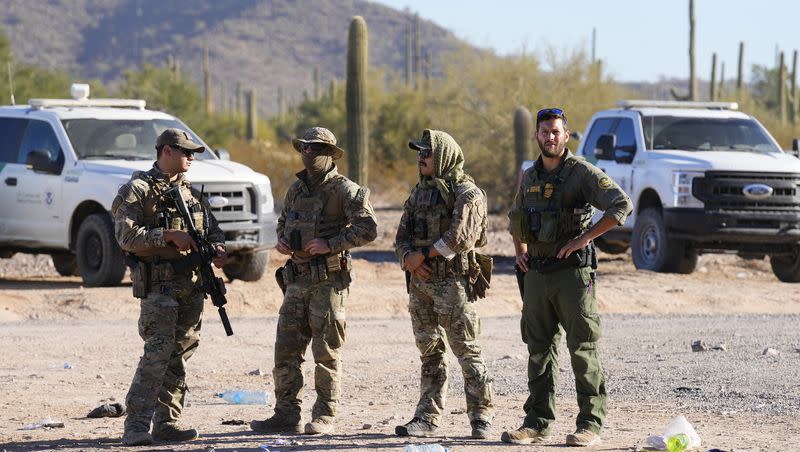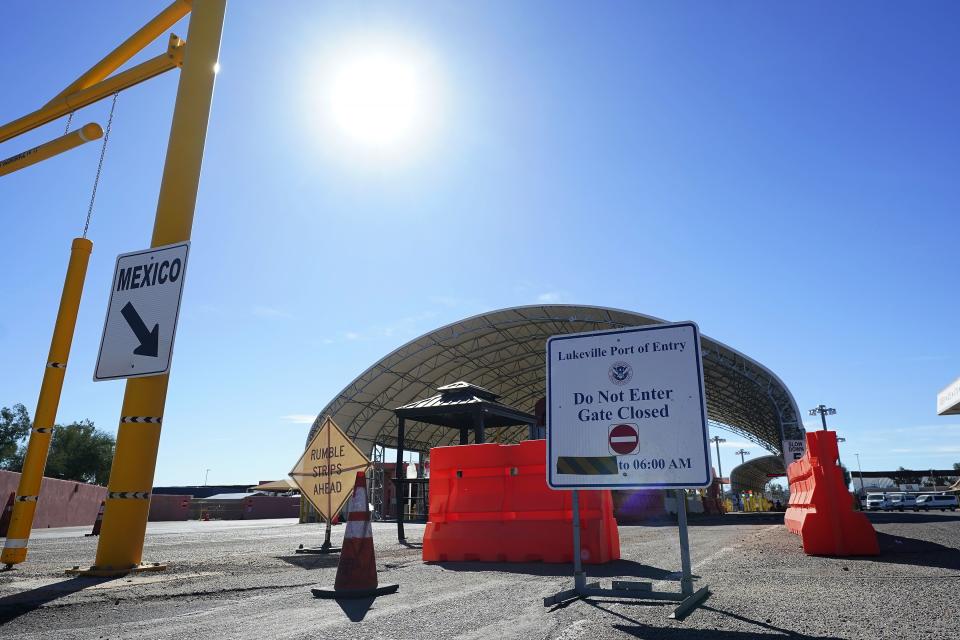Sens. Kyrsten Sinema and Mark Kelly, Gov. Katie Hobbs criticize Lukeville border closing

- Oops!Something went wrong.Please try again later.
- Oops!Something went wrong.Please try again later.
U.S. officials temporarily closed a border crossing in Lukeville, Arizona, last week. Since then, Arizona lawmakers have expressed concerns about how this closure could negatively impact the economy and present public safety risks.
Lukeville is an unincorporated town along Highway 85. The port of entry located there crosses into Sonoyta, Sonora, Mexico. The population of Lukeville is 35 if you go by U.S. census numbers. “But the mobile home park where many residents lived now appears abandoned, with boarded up buildings and a scattering of old manufactured homes,” per The Associated Press.
The U.S. Customs and Border Protection released a statement saying the port of entry was temporarily closed “in response to increased levels of migrant encounters at the Southwest Border, fueled by smugglers peddling disinformation to prey on vulnerable individuals.”
Arizona Sens. Mark Kelly and Kyrsten Sinema and Gov. Katie Hobbs released a joint statement criticizing the decision to temporarily close the border and called upon the federal government to act.
“This is an unacceptable outcome that further destabilizes our border, risks the safety of our communities, and damages our economy by disrupting trade and tourism,” the joint statement said. “The federal government must act swiftly to maintain port of entry operations, get the border under control, keep Arizona communities safe, and ensure the human treatment of migrants.”
Available data showed that around 3,140 people in vehicles and 184 pedestrians crossed into the U.S. via Lukeville every day in October, according to PBS.

Some like Why, Arizona, resident Stephanie Fierro depend on the border crossing remaining open to see family. She works at a cafe in Why while her husband lives across the border in Mexico. “We come and go every day,” Fierro told The New York Times.
There are other families with similar arrangements: some live in Mexico and work in Arizona. They “are scrambling to figure out how to get their children to school, commute to work, or to care for parents they can no longer easily visit,” The New York Times reported.
When the closure went into effect, it also affected asylum-seekers who are waiting for U.S. Border Patrol agents to pick them up and transport them in vans for processing, The Arizona Republic reported.
Migrants who are waiting alongside the border to be processed are huddling around fires to remain warm as temperatures drop at night. “The wait to be processed was so long in recent days that Mexican families and merchants traveled regularly to the staging ground to sell drinks and food, hoping to convince the desperate newcomers to buy their burritos, tamales and cups of coffee from the other side of the border wall,” CBS News reported.
Daniela Segura Salgado, who traveled from Mexico with her four young children, told CBS News that her family was fleeing Guerrero due to the violence in the area. “I am fighting as much as I can so my children can have something better. A warm bed where they can sleep without having to hear a gunshot.”
Agents have been taking migrants to different areas like the Ajo station or Tucson for processing, The Associated Press reported.
“This is a humanitarian crisis that’s happening in our own backyard,” Dora Rodriguez, chairperson of Tucson nonprofit Humane Borders, told The Associated Press. “There are hundreds of people, including infants and children, who are stranded in remote areas of the desert for days.”
After closing the Lukeville port of entry, officials said that they were diverting personnel and resources to migrants unlawfully entering the U.S.
“As we respond with additional resources and apply consequences for unlawful entry, the migration trends shift as well,” the statement from U.S. Customers and Border Protection said and named Nogales port of entry and San Luis port of entry as places where migrants could enter and exit the U.S.
The statement also referenced smugglers as a reason why the Lukeville port of entry was closing down temporarily. “Because Lukeville is so remote, Border Patrol staffing is light, so traffickers in the region controlled by Mexico’s Sinaloa cartel steer people there,” The Associated Press reported.
Hobbs visited the Lukeville port of entry on Saturday and, in a video posted on X, she called on the federal government to aid Arizona.
“This week I sent a letter to President Biden demanding the resources and manpower to open this port of entry, and we announced Operation Secure to step up state support for local law enforcement,” Hobbs said.
The Arizona governor also requested $512 million in reimbursement from the federal government, saying that closing the Lukeville port of entry has resulted in “an unmitigated crisis.” Hobbs indicated that Arizona would continue to seek reimbursement from the government moving forward.
“We need the federal government to step up, do its job, and bring security and order to our border,” Hobbs said.
Public opinion of the way the government handles what is happening at the U.S.-Mexico border remains critical.
A poll conducted by The Wall Street Journal found that 64% of voters disapprove of the way Biden has dealt with border security. Broken down along party lines, 33% of Democrats and 91% of Republicans have expressed disapproval. Disapproval is at its highest point since March 2022, when The Wall Street Journal began polling on this question.

